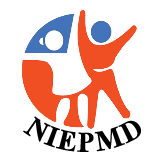Department of Special Education

Children with Multiple Disabilities are assessed with use of functional approach.Individualized educational programme with periodical evaluation has been followed for the children attending special education services. The role of parents is emphasized all through the training program. Multi-sensory and low cost teaching learning materials are designed for increasing the effectiveness of teaching and learning process. Curricular and co-curricular activities are taught with special emphasis on making them inclusive.
Special Education Centre
This Institute established a Model School name as "Thiramai" (means 'Ability' in Tamil) Special school in the year 2007-08 to cater the educational needs of clients with Multiple Disabilities. The school functions with the following units based on the disability categories. Unit for Early Childhood Special Education Unit for Cerebral palsy with additional disabilities Unit for Deafblind Unit for Autism with additional disabilities
Unit for Early childhood Special Education (ECSE)
In ECSE class children below 6years with developmental delay are enrolled. All children are assessed on their residual capabilities and the programmes are implemented accordingly. Montessori method of teaching is predominantly applied in the teaching learning process. The focus areas for training are self help skills, activities for daily living, socialization, language promotion, motor and cognitive skills. Play way method is used to develop deficit areas. The main focus for training is to promote inclusive education. The children with developmental delay are given Pre School training to facilitate inclusion as much as possible.
Unit for Cerebral Palsy and Additional Disabilities
This unit was divided into Primary class, Secondary class and Prevocational class. Primary classroom: Children of age group 7-10 years are given training in functional skill areas such as personal, social, academic, occupational and recreational activities. Secondary class room: Children between the age group of 11-14 years are trained in functional areas focusing on academic, domestic and occupational skill development. Prevocational class room: Children above 14 years of age are prepared for transition from school to vocational training. They are given training in work related behaviors.
Unit for Deaf blind
Children with deaf blind / dual sensory impairment are trained in three major areas such as communication, orientation & mobility and basic concepts. Experiential learning approach through concrete educational aids /materials are used for the same. Tactile and kinesthetic methods are used to teach.
Unit for Autism with Additional Disabilities
Children diagnosed as autism spectrum disorders with additional disabilities are trained in this unit. The module includes training to improve the communication and socialization in these children. A holistic model is applied to enhance the specific and general abilities.








 Screen Reader Access
Screen Reader Access



